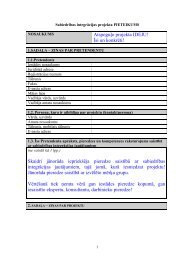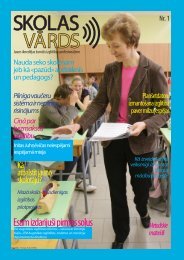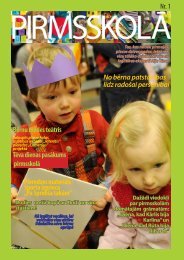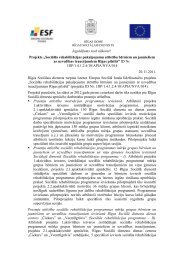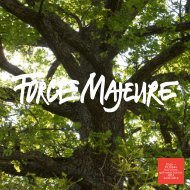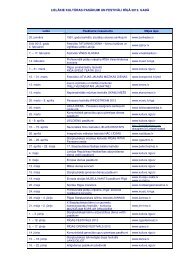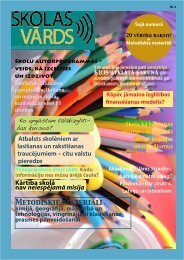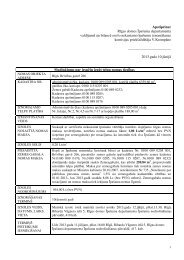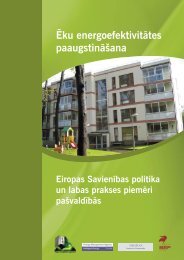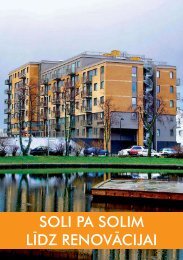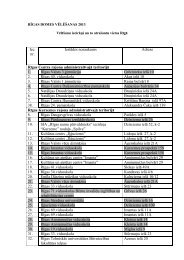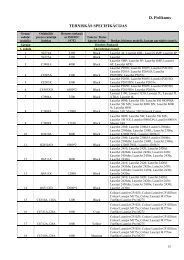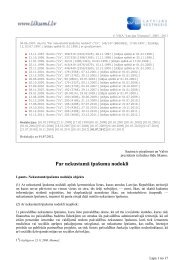Riga - European Capital of Culture 2014 candidate
Riga - European Capital of Culture 2014 candidate
Riga - European Capital of Culture 2014 candidate
- No tags were found...
Create successful ePaper yourself
Turn your PDF publications into a flip-book with our unique Google optimized e-Paper software.
even today, nearly 20 years after regaining its independence,Latvia and its capital city still have their share <strong>of</strong> Soviet-era ‘scars’:abandoned factory sites, industrial waste, and a polluted environmentthat still continues to be an eyesore in a number <strong>of</strong> places.This is due, in part, to continued careless attitudes and to the lack<strong>of</strong> a sense <strong>of</strong> responsibility by a number <strong>of</strong> people for the environmentaround them.This year, the organizers <strong>of</strong> the “Great Talka” <strong>of</strong> 2009 came upwith a very ambitious goal – to continue such voluntary cleanupoperations for at least the next ten years, so that by the 100 th anniversary<strong>of</strong> Latvia’s Declaration <strong>of</strong> Independence in 2018, Latviawill <strong>of</strong>ficially have become the ‘Cleanest Country in the World’.While this may seem like a very grand plan, Latvia is a relativelysmall country. And while Latvia may not be the richest country inthe world, one <strong>of</strong> its greatest assets may one day lie in its pristinenature and tidy city streets.The cleaner our neighbouring countries become, the cleanerwe will also want to be. This applies to every country in Europe,which is why such talka events should be implemented at thewider, <strong>European</strong> level. We hope that Latvia’s talka movement willhelp to bring Europe’s people closer together in their joint workfor a cleaner environment. We also hope that our neighbouringcountries, as well as the rest <strong>of</strong> Europe and the rest <strong>of</strong> the world,will seek to follow our example and take part in a friendly competitionto hold the title <strong>of</strong> ‘Cleanest Country in the World’.The talka as a collective event, has its roots in ancient ethnographictraditions, which may be why it gained such immediateand massive acceptance in Latvian society. Traditionally, talkaparticipants sang while they worked and then celebrated the workthat they had done. While the times have since changed greatlysince those bygone days, the essence remains the same. Natureis an asset that will never belong to any one person.to bring along a stone or boulder, in order to construct a joint artinstallation – a spiritual symbol that will testify to the aspirations<strong>of</strong> the people <strong>of</strong> <strong>Riga</strong>, <strong>of</strong> Latvia and <strong>of</strong> other countries, for thesoundness <strong>of</strong> their souls, environment, cities and countries. Theidea for this installation stems <strong>Riga</strong>’s past history. During the firsthalf <strong>of</strong> the 17 th century, <strong>Riga</strong>’s administrators decided that all <strong>of</strong>the city’s streets should be laid with cobblestones in a uniformmanner. Thus, every peasant who visited the city had to bringalong at least two stones from the countryside for covering <strong>Riga</strong>’sstreets as an ‘entry fee’ or ‘tax.’ However, this time, the bringing <strong>of</strong>stones for the construction <strong>of</strong> <strong>Riga</strong>’s ECC art installation will be avoluntary affair, in line with Latvian talka traditions.After helping to build the art installation, <strong>Riga</strong>’s talka participantswill gather at <strong>Riga</strong>’s Mežaparks open-air stage, in order to celebratea job well done by singing collectively. This stage was recentlyrebuilt and can host more than 100,000 performers andspectators. There, the participants will take part in the culmination<strong>of</strong> the “<strong>Culture</strong> Talka” – the 1 st General Song Celebration forSpectators – a massive event in which the public will sing-alongwith various choirs. As we have already mentioned, for the past135 years, each <strong>of</strong> Latvia’s song celebrations has traditionallybeen attended by about 100,000 people, despite the various regimechanges that the country has experienced, and this songfestival tradition has become one <strong>of</strong> Latvia’s most potent nationalidentity symbols.Latvia’s National Television would also be involved in broadcastingthis event and has already expressed its readiness to cooperatewith <strong>Riga</strong> in preparing some <strong>of</strong> the potential ECC activitiesfor <strong>2014</strong>. One idea is to hold a tele-conference at the Mežaparksopen-air stage with cleanup organizers in other <strong>European</strong> cities,where people can exchange their impressions about their cleanupday at work and its positive results.the great talka or great voluntary cleanup operationwill also become a culture talkaThe organizers <strong>of</strong> this year’s “Great Talka” have agreed to cooperatewith <strong>Riga</strong>’s ECC task group in <strong>2014</strong>. <strong>Riga</strong>’s application workgroup has held discussions with Vita Jaunzeme, an organizer <strong>of</strong>the “Great Talka”, on holding a “<strong>Culture</strong> Talka”, which could closethe environmental cleanup and refurbishment talka <strong>of</strong> <strong>2014</strong>.The day after they finish planting trees, collecting litter, and conductingother tasks, each the cleanup’s participants will be invited132 133



